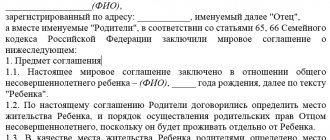256
Even if the spouses do not have minor children, the divorce procedure can result in a serious conflict. And the very fact of having children not only significantly complicates the formal process of divorce, but in some cases limits the right to initiate divorce on the part of the husband.
Where to start a divorce if there is one or more minor children in the family? As a general rule, divorce in such a situation is allowed only in court.
Rules and conditions for divorce in the presence of small children: up to one year, up to three years
The termination of family relationships inevitably entails a change in the child’s living conditions and affects the level of his financial support. In order to guarantee the preservation of a decent quality of life for a child, the legislator has limited the possibility of divorce without a trial, even in the absence of disputes between spouses.
Important! In addition to the divorce process itself, the court decides the issue of the child’s place of residence after the divorce, issues of collecting alimony and the participation of both spouses in his upbringing.
Features of the trial:
- if the spouses have no disagreements on these issues, the divorce court will take place as quickly as possible;
- If the spouses have a dispute over the issues of raising children, the divorce process will be aimed at protecting the interests of the child and maintaining living conditions for him that are as close as possible to the previous standard of living.
If the child is under 1 year old
The general procedure for divorce in the presence of children remains unchanged. However, a man's right to demand a divorce is significantly limited by family law. This is done to protect the interests of not only the spouse, but also the child, and is also due to possible stress and deterioration of the relationship in the period after the birth of the child.
Restrictions on divorce with a child under 1 year old and when the wife is pregnant:
- the husband has no right to demand a divorce during his wife’s pregnancy;
- The husband does not have the right to demand a divorce if the joint child is under 1 year old.
If the child was stillborn or died subsequently, a similar restriction applies until 1 year has passed from the date of birth of the baby.
In all cases where the husband's right to initiate a divorce is limited, the divorce can only be effected with the consent of the wife. If such consent is absent, the child's father has no legal grounds to file a claim for divorce, except in cases of simultaneous challenge of paternity. If paternity of a joint child is challenged, then the court is obliged not to take the listed restrictions into account (Article 17 of the RF IC).
If the child is under 3 years old
If there are minor children under the age of 3 years, there are no restrictions or features in the process of divorce tied to the age of the child. However, by virtue of the provisions of Art. 90 of the RF IC, during divorce proceedings, the mother of the child has the right to establish alimony for her maintenance until the child reaches the age of 3 years.
This obligation of the husband is established by a court decision simultaneously with the decision on the issue of financial support for the child. When the last child reaches the age of 3 years, payments for the maintenance of the wife, established by the court, are subject to termination.
Arbitrage practice
Below we will describe a rather rare case from practice when a father was able to defend his children and take them all from their mother.
In September 2021, the Zheleznodorozhny Court of Novosibirsk considered the husband's claims against his wife. Their essence was as follows:
The husband asked for a divorce. As a reason, he indicated that his wife litters the apartment with garbage; there are mountains of things in all the rooms. As a result, it is impossible to comfortably move around the home, use the kitchen or toilet. A cluttered apartment also prevents children from playing normally.- The husband asked to give him all the children, of whom the couple had three, and to determine their place of residence with him. The husband explained this for the following reasons: In matters of education, he is helped by his parents, who introduce his children to useful activities and work.
- The wife deprives the children of the space they need in the home, which does not correspond to the children’s interests.
- He has a permanent and stable job.
- He monitors their school progress, develops children by attending cultural events.
- Children love their father very much.
The wife, recognizing that it was time to end the marriage relationship with her husband, objected to giving her children to her husband. She gave the following reasons:
- She did a complete cleaning of her home.
- The employer characterizes her positively.
- She has never been convicted or subjected to administrative punishment.
- He does not suffer from alcoholism or other bad habits.
- What is rubbish and rubbish from the husband's point of view is used by the defendant to perform work duties.
A representative from the state guardianship institution said that the children should stay with their father, since being in their mother’s apartment could harm the health of minors.
Based on the examined documents and heard the explanations of the parties, the judge decided to dissolve the family relationship due to the fact that both spouses agree to the breakup of the family. In relation to the dispute over the children, the judge found the following facts:
- The conditions for the presence of children in the apartment owned by the plaintiff, according to the act of the state guardianship institution, were considered satisfactory. At the same time, an inspection of the defendant’s apartment showed that the apartment was littered with garbage. Therefore, children should not be in this home.
- The defendant and plaintiff have permanent jobs and, accordingly, a stable income. In addition, they are both in good standing with their leaders.
- After interviewing the son, who went to live with his dad, it turned out that the reason for the move was the dirt in his mother’s apartment. A survey of daughters revealed that they are comfortable living with their mother, and trash does not bother them. The unsatisfactory condition of the apartment, according to them, was caused by the depression of the mother, who previously did not want to clean the apartment or cook food for them, but at the time of the trial she admitted her mistakes and began to correct them.
Thus, after assessing all the facts, the judge decided that the children would be better off in their father’s apartment, despite the different opinion of the minor girls.
Where and where to file for divorce
Where to start, where to go if the spouses decide to end the marriage relationship, and the family has one or more minor children?
The Family Code of the Russian Federation allows for the only method of divorce in such a situation - only through the court!
However, in exceptional cases, divorce with a child is allowed through the registry office.
MARRIAGE REGISTRY. Conditions
In exceptional cases, the law allows divorce in the presence of children through the civil registry office.
As an exception, termination of family relations through the civil registry office is allowed even if there are children in the following cases:
- a court decision on incapacity has been made in relation to one of the spouses, or the fact of unknown absence has been confirmed;
- a sentence of real imprisonment for a term of more than three years was passed against the husband or wife.
In this case, divorce is allowed without a trial even if there are children.
In the listed cases, it is enough to contact the registry office for the spouse who wants to get a divorce, and this application will be granted regardless of the presence of children.
In any other cases, you cannot apply to the registry office for divorce if you have a child.
Consideration of a case on termination of marriage in the absence of one party in the registry office
The Family Code provides spouses with the opportunity to divorce through administrative (simplified) and judicial procedures. In the first case, we are talking about married couples who do not raise common offspring under 18 years of age and property acquired jointly.
If both spouses decide to divorce, they have the right to contact the civil registry office to which the citizens' registration address belongs or the institution that registered their family union. Spouses submit a joint application, supported by passports and marriage certificate. You will also need to pay a fee of 650 rubles. on each side.
The IC lists the circumstances that give the right to divorce through the registry office without the presence of a spouse on the initiative of one party. Citizens have this right, the other half of whom have been serving a prison sentence for more than 3 years, have been declared insane, or are listed among missing citizens. In such a situation, the initiator must fill out an application according to the sample presented at the registry office and attach the following papers to it:
- marriage certificate (original);
- a photocopy of your own passport;
- a document allowing you to obtain a unilateral divorce (a court verdict with a wet seal; a decision recognizing incapacity or that a citizen has been declared missing);
- receipt of payment of duty to the state.
The duty in this case will be 350 rubles.
This method of ending a marriage is the fastest possible - within a month the applicant will be able to issue a certificate of termination of marriage.
Which court should I file for divorce in?
Magistrate's Court. Conditions
Divorce of marriage falls within the competence of magistrates. The magistrate's court must consider all claims for divorce if the spouses have minor children, but an agreement has been reached between them on the further procedure for raising the children and their place of residence.
Thus, the magistrate’s court has jurisdiction over cases of divorce:
- if the spouses have children together;
- if there is no dispute between the spouses about the order of their upbringing and place of residence.
Simultaneously with the claim for divorce, a demand can be made to determine the place of residence of the child or to establish a procedure for communicating with him, and other disputes may also arise regarding the future fate of the children. Such a dispute will be heard in the district court.
If, at the time of filing the claim, the spouses reached an agreement on the procedure for raising joint children, and during the court hearing they had a dispute and a clarifying statement of claim with new requirements was filed, the magistrate will be obliged to transfer the divorce claim to the district court of jurisdiction.
District Court. Conditions
District (city) courts will consider claims for divorce if there are children in the following cases:
- the spouses were unable to reach an agreement on with whom the child would live;
- the claim states a requirement to determine the child’s place of residence;
- the question is raised about establishing a procedure for communication with the child or limiting such communication on the part of the second spouse.
Also, the divorce case will be transferred to the district court if, along with the divorce, the spouse submits a demand for the division of property worth more than 50 thousand rubles.
What to do if the plaintiff does not appear in court
If the plaintiff does not come to court on the initial summons, the hearing must be postponed. The absence of the plaintiff, summoned by a secondary subpoena for the proceedings of the divorce claim, gives the initiative in the process to the defendant, who must make one of two possible decisions:
- Request that the proceedings be continued.
- Refuse further legal proceedings. In this case, the judge is obliged to leave the application filed by the plaintiff without consideration.
How to file for divorce if you have minor children
Statement of claim
As a general rule, an application for divorce is submitted to the magistrate's court at the defendant's place of residence.
The Code of Civil Procedure of the Russian Federation provides exceptions to this rule:
- the spouse with whom the minor child lives has the right to file a claim for divorce in the court at his place of residence;
- a spouse who, for medical reasons, is deprived of the opportunity to leave his place of permanent residence, also has the right to apply to the court at his place of residence.
Place of residence is considered to be the place of official registration (permanent or temporary). Actual residence without registration cannot be used as a justification for filing a claim in court.
Example. If the defendant is registered in Volgograd, but actually lives in Moscow without registration (even temporary), then the claim must be filed in the Volgograd court at his place of registration.
Preparing a claim
You can draw up a statement of claim either yourself or seek help from a lawyer.
Currently, on the Internet you can find a lot of different samples for divorce with children, but all of them must necessarily comply with the requirements of Art. 131-132 Code of Civil Procedure of the Russian Federation.
The statement of claim must contain the following information:
- Name of the court, its address.
- Full names and addresses of the parties, their contact details.
- Information about the marriage.
- Reasons for divorce.
- Information about children, about consent reached or not reached.
- Justification for leaving the child behind.
- Requirements addressed to the court: divorce, child’s place of residence, alimony, etc.
Sample statement of claim 2021
The presented sample reflects only the simplest situation with a divorce without disagreement on the issue of raising children. To file a claim for divorce with children, complicated by the requirement to determine the child’s place of residence, it is best to contact an experienced lawyer.
Sample statement of claim
Divorce documents with minor children 2021
The list of documents that must be attached to the claim for divorce is prescribed in Art. 132 Code of Civil Procedure of the Russian Federation. However, the law does not establish a clear list for claims for divorce and the applicant must determine the list of documents in relation to each case. An experienced lawyer can help in this matter.
Typical list of documents for divorce:
- a copy of the claim for the defendant;
- fee payment receipt;
- copies of the applicant's passport;
- a copy of the marriage certificate;
- information about the place of residence of minor children (certificate);
- additional documents for each of the additional claims filed simultaneously with the divorce;
- a document confirming payment of the state fee in the amount of 600 rubles.
If the application is submitted by a representative, a power of attorney must be attached. It is allowed to attach a copy of the power of attorney, but only if the representative plans to participate in the meeting and submits the documents in person. When sending a claim by mail, it is best to attach the original or a notarized copy.
At the stage of filing a claim for divorce, the court will not require any other documents. During the court hearing, on their own initiative or at the request of the court, the parties may present additional evidence relevant to the case. These may include certificates from the place of work (when deciding on the amount of alimony), characteristics from the place of residence or service (when determining the child’s place of residence).
The composition of additional documents for each case of divorce is individual and can only be determined in advance by an experienced lawyer. contact our expert lawyer right now and provide yourself with a reliable evidence base in court!
Copy of the claim
A copy of the statement of claim is attached simultaneously with the filing of the main claim and is intended for the defendant.
It is impossible to independently transfer the claim to him by sending it by mail, as this can be done under the CAS or APC procedure - in civil proceedings, the court itself sends documents to the parties.
In addition, a copy must be attached for third parties, if they will participate in the case - for example, guardianship and trusteeship authorities.
You can make a copy in several ways:
- print out several copies of the claim and sign them;
- make a photocopy of the already signed statement of claim.
The law does not establish specific requirements for a copy of a claim; in practice, courts even accept handwritten copies copied from the original.
Copy of the passport
A copy of the passport is attached to confirm the identity of the applicant and to simplify the entry of primary data about the applicant by court staff.
The requirement to provide a copy of a passport is not specified in the legislation, but was formed in the course of law enforcement practice. A copy of your passport is not required.
When submitting an application in person, you can present the original passport to the court staff and not attach a copy. But often court officials themselves copy the passport and attach a copy of it to the case.
Marriage certificate
Unlike the registry office, where submission of a marriage certificate is mandatory (and then only to the registry office that did not register the marriage), it is enough to submit a marriage certificate to the court.
This is often required when the marriage certificate:
- lost;
- destroyed;
- held by the second spouse.
If there are difficulties in obtaining a duplicate of the certificate or even a marriage certificate, the plaintiff has the right to petition the court to request these documents.
Certificate of children's place of residence
When dissolving a marriage, taking into account the interests of the children, the applicant needs to confirm the fact that the child lives with him or, conversely, notify the court that the child lives with the second parent.
Most often, this document should be presented in cases where there is no dispute about the place of residence of the children as evidence that the place of residence of the child has already been determined, is known to the second spouse and is not disputed by him. A certificate will also be required to confirm the plaintiff’s right to choose jurisdiction at his place of residence.
Additional documents
When making additional demands in a claim for divorce in the presence of children, the plaintiff will need to present a number of additional documents.
Documents for disputes about children:
- conclusions of guardianship and trusteeship authorities;
- information about bringing the second spouse to administrative or criminal liability;
- information about the material and living conditions of the children’s place of residence;
- data on children’s leisure time, their provision, and pastime.
Documents for division of property:
- certificates of ownership of real estate and vehicles;
- purchase and sale agreements, checks and other documents confirming joint purchases;
- information about property valuation.
Documents for collecting alimony:
- information about the income of both parents;
- documents confirming the child’s special need for additional support (disability, serious illness);
- information about the child’s place of residence.
The listed examples of documents are for informational purposes only and depend on the severity of the dispute, the composition of the property, the reasons for the disagreement and a host of other factors. In each specific case, it is recommended to seek the help of an experienced lawyer who will accurately determine a comprehensive list of documents specific to your situation. Consult our specialists right now by asking them a free question.
List of documents for filing a claim
When preparing documents, you must remember that you always need to make copies of them in an amount equal to the number of participants in the proceedings. A separate copy of all documents is prepared for the court.
So, for a successful divorce process you need to collect the following papers:
Statement. The sample form can be downloaded here.- Duty payment receipt.
- Children's birth certificates.
- Marriage certificate from the state registry office.
- Marriage contract, alimony agreement, agreement on the place of residence of a minor, if they were concluded.
- Information that the plaintiff has about the place of work and the expected amount of earnings of the defendant. This information will be required to determine the amount of alimony allowance.
- Request for inspection of residential premises for suitability for living of a minor.
- Characteristics of the plaintiff from kindergarten teachers, school teachers, work colleagues or the employer.
- Psychological conclusion about the presence of an emotional connection with a minor.
- Any evidence that puts the defendant in an unfavorable position (certificates of past criminal records; information about undergoing treatment for alcohol or drug addiction; the presence of a dangerous disease, for example, mental illness, AIDS or tuberculosis; beatings of family members, confirmed by documents from the police or medical facility).
State duty
When applying for divorce to the registry office or to the court, you must pay a mandatory state fee. Without making this payment, the application either to the registry office or to the court cannot be accepted for consideration.
| Method of divorce and other actions | Amount of state duty and when to pay |
| Divorce through the registry office | 650 rubles before filing an application for each spouse |
| Divorce through a magistrates' or district court | 600 rubles when filing a claim and the same amount will be recovered from the second spouse |
| Requirement to determine the child’s place of residence | Not taxed, because declared in the interests of children |
| Request for division of property | Calculated according to the rules for calculating the duty for a claim for division of property. It is paid by the plaintiff based on his share, then additionally collected from the defendant. |
| Applying to the registry office after the court decision has entered into force for the issuance of a divorce certificate | 650 rubles from each spouse |
The state fee must be paid before going to court. Without supporting documents (original receipt), the judge first leaves the claim without progress, and then, if the fee is not paid, returns the statement of claim. For more information about the size of the state duty and the procedure for its payment, read the article “How much does divorce cost in 2021?”
Lawyer's answers to frequently asked questions
Is it possible to submit an application independently through the State Services portal?
Yes, the feature is available. Each spouse submits an application to the registry office from his own account. It is also possible to apply for a divorce certificate by court decision. What it looks like:
- We are registering on the website.
- Log in to your account and select “Registration of divorce”.
- We fill out the application, select the registry office: at the place of marriage, the applicant’s registered address.
- We pay the state fee, choose a convenient date for the visit to the registry office, and confirm the operation.
Notifications are sent to applicants on the portal when they are ready. This method is convenient if spouses do not have the opportunity to come to the registry office to submit an application in person.
But to obtain a divorce certificate and have your passport stamped, you will have to visit the registry office in person. Moreover, you must have the originals of all documents sent through the electronic portal with you.
Is it possible to file for divorce without a spouse if he is in prison?
Yes, if the sentence exceeds 3 years. You should contact the registry office, having secured a court verdict, a passport, a document for the child, and a marriage certificate.
Is a unilateral divorce possible if the second spouse is a foreigner and does not live in the Russian Federation?
Yes. To do this, he just needs to send a notarized consent. If he objects, the claim is filed in court at the defendant’s last address of residence, indicating the impossibility of traveling to him due to his residence in a foreign country. If the marriage is registered in the Russian Federation, the moment of its dissolution is recognized as the entry into legal force of the decision. When registering a relationship in another country, divorce will take place only after the document is recognized by its government agencies.
What should I do if the trial took place without me?
In this situation, it is necessary to challenge the decision. Before the commencement of its action, an appeal is filed, after which a cassation is filed.
Is it possible to collect alimony when filing for divorce?
Yes, such a possibility is provided for in the Code of Civil Procedure of the Russian Federation. The claim reflects information about all children, as well as the form of recovery - in shares or a fixed amount. The hearing takes place in the district court.
How does the divorce process work if you have minor children?
The official basis for initiating divorce proceedings is the filing of an application to the court by one of the spouses. The claim can be filed either by the plaintiff in person or by sending it by registered mail.
The judicial divorce procedure involves several stages, regulated in detail by procedural legislation.
The divorce process consists of the following stages:
- Submitting a statement of claim to the magistrate's court in accordance with the rules of jurisdiction.
- Initiation of divorce proceedings by the court.
- Sending the defendant (second spouse) a copy of the statement of claim and notice of the time and place of the court hearing.
- Conducting court hearings with the participation of both parties, or in their absence (if there is evidence of proper notification and in other cases provided for by law).
- Consideration of the issue of the child’s place of residence, obtaining the consent of the second spouse or studying his arguments against the applicant’s claim.
- Compliance with the condition on the possibility of reconciliation of the parties (the court has the right to give the spouses time to resolve the issue of continuing family relations, but not more than three months).
- Issuance of a judicial act satisfying claims for termination of marriage.
- Entry into force of the decision and its execution.
After filing a claim, the defendant has the right to present his objections to the statement. The defendant exercises this opportunity orally through personal participation in court hearings, or by submitting a written response indicating the grounds for objections.
To find out how the divorce process is going and to clarify the date of the next court hearing, the parties can use the special GAS system “Justice”, in which each magistrate or district court of the Russian Federation has its own publicly accessible page.
Basic principles of property division
The division of property assets of spouses is based on 2 principles:
- Independent division of property carried out by spouses. Its terms are set out in a prenuptial agreement or separation agreement.
- Judicial division of property based on the norms of the Family Code.
Comparative characteristics of a marriage contract and an agreement on division of property are presented in the table.
| Comparison criteria | Marriage contract | Agreement |
| Property regime | Treaty | Joint |
| Type of divided property assets | According to the terms of the agreement, both property acquired during marriage and property owned personally by one of the marriage partners can be divided. | Only property assets acquired during marriage. |
| Time of confinement |
|
|
| Conclusion form | Notary | Notary |
| The procedure for determining shares | By agreement of the parties | By agreement of the parties |
| Conditions of invalidity |
|
|
If the marriage partners could not or did not want to agree on how they would divide the common property, the judge will deal with this issue when a corresponding demand is made by the plaintiff or defendant. In his work he uses the principles described below.
First of all, the judge needs to distinguish between the marital property and the personal property of each marriage partner. The law states that the category of “matrimonial property” includes all things that were acquired after the wedding day with the common money of the spouses or were registered in the name of at least one of them. It does not matter which spouse paid for the said property.
Also, the court has the right to transfer any property from the category of “personal property” to the category of “joint property” if the interested spouse proves that he has made improvements to a personal property belonging to the second party to the marriage at the expense of his labor, property or money. The result of the improvement must necessarily be an increase in the value of the second spouse’s personal property. Increase in value is the key concept on which a judge decides to transfer property from one category to another.
The Family Code classifies the following categories of property assets as personal property of a marriage partner:
- Copyright for intellectual works.
- Items acquired free of charge (inherited, donated, exchanged), when the acquirer in the transaction is one spouse. However, if both spouses are indicated as purchasers in the contract, then the property will be considered joint.
- Property purchased or acquired free of charge before marriage.
- Hygiene supplies; property required for practicing a profession; shoes; cosmetics; wigs and clothes.
- According to a court decision, things acquired by one spouse in an official marriage, but during the period of separation, are considered personal.
Jointly acquired property that became the property of marriage partners after marriage and before divorce is recognized as:
Any income of each spouse obtained legally, for example, salary, benefits, investment income, financial assistance, insurance payments.- Securities.
- Royalties received for the sale or use by third parties of intellectual works.
- Movable things (furniture, cars).
- Shares in the authorized capital of legal entities.
- Deposits opened in banks or non-bank credit institutions.
- Real estate.
- Share contributions to housing cooperatives or mutual funds.
- Debts on consumer loans or mortgages.
- Luxuries.
The judge divides joint property in accordance with several principles prescribed in the Family Code.
| Principles of division of property | A comment |
| Equal shares of spouses by default | The judge, in the absence of special circumstances, is obliged to divide the joint assets in half. Special circumstances mean:
|
| Compensation | If one marriage partner has a larger share than the other, the law obliges the first spouse to compensate for the property not received by the second spouse with money, by performing actions in favor of the second spouse, or by transferring something to him. |
The procedure and stages of divorce with children through the magistrate's court
The procedure for divorce with children through the Magistrates' Court is as follows:
- Determination of jurisdiction.
- Filing a claim.
- Resolving the issue of accepting a claim.
- Preparing the case for trial.
- Court hearing.
- Examination of evidence.
- Debate of the parties.
- Making a decision.
- Deadline for appealing the decision.
- Entry of a court decision into force and its execution.
Determination of jurisdiction and filing a claim
Before preparing a claim, it is imperative to correctly determine the jurisdiction in order to exclude the return of the statement of claim.
The claim is drawn up in accordance with the requirements of Art. 131 of the Code of Civil Procedure of the Russian Federation, and the attached documents are formed taking into account the provisions of Art. 132 Code of Civil Procedure of the Russian Federation. Above is a list of information that must be included in the claim and possible attachments.
Resolving the issue of accepting a claim
Within 5 working days from the date of receipt of the claim, the magistrate or district judge must decide the fate of the submitted application. If all the provisions of the law are observed when drawing up the claim, then the application is accepted by the judge and a civil case for divorce in the presence of children is initiated.
| Judge's decision | Causes | Plaintiff's actions |
| The application was left without progress | The claim was filed in violation of the requirements of Art. 131 Code of Civil Procedure of the Russian Federation or Art. 132 Code of Civil Procedure of the Russian Federation | Attach missing documents or re-draft the claim |
| The application was returned along with documents |
| Eliminate these shortcomings and file the claim again (in the correct court). |
| The claim was denied | There is already a decision in the case between the same parties and on the same dispute. | Repeated appeals regarding a dispute already resolved by the court are not permitted. |
A private complaint is filed against the ruling, if it interferes with the further progress of the case, within 15 days from the date of issuance. In all cases, the plaintiff has the right to both take measures to eliminate the problems indicated by the judge and appeal the court decisions to a higher authority.
Preparing the case for trial
When the judge accepts the claim for proceedings, he issues a ruling on preparing the divorce case for consideration.
The definition specifies the actions that both the plaintiff and the defendant must take before the hearing.
Most often, the list of actions is of a typical nature (submit original documents, prepare an objection), but it is possible to order specific actions that relate exclusively to a given case. For example, provide a certificate of the child’s place of residence or obtain an inspection report of living conditions from the guardianship authorities.
Court hearing
The court notifies the parties in advance of the date and time of the hearing.
It is highly advisable to appear at the court hearing in person or, if such an appearance is not possible, to notify the court in advance by telephone or in a written statement of the reasons for failure to appear.
Both the plaintiff and the defendant may apply:
- postpone the hearing of the case for valid reasons (illness, business trip, untimely (less than 3 days) notification of the process;
- consider the case without your participation (in the petition you must indicate the reason and your attitude to the claim).
The court will return the claim without consideration if the plaintiff fails to appear twice when summoned and the defendant does not request a hearing. However, leaving without consideration does not deprive the plaintiff of the right to request a divorce again.
The participation of children in the court hearing is not required. But when deciding the issue of their place of residence, the court is obliged to take into account the opinion of children over 10 years old.
The court also pays special attention to the following issues:
- who supports the child at the time of filing the claim;
- with whom the children actually live;
- the opinion of the second spouse about his participation in raising the child;
- the position of the guardianship and trusteeship authorities if a request is made to determine the place of residence of a minor.
At the beginning of the court hearing, the judge hears first the plaintiff and then the defendant.
Examination of evidence and debate between the parties
At the court hearing, all evidence presented by the parties is carefully examined. The court may require original documents if they were submitted in copies, or request other information.
During the examination of evidence, the parties may give explanations and ask each other questions only with the permission of the presiding judge.
After examining the evidence, the court proceeds to debate.
During the debate, spouses can ask each other questions and express their opinions on the fact that certain circumstances have been proven. It is in the debate that the court's attention is focused on the facts established during the judicial investigation. Petitions may also be submitted.
Making a decision and appealing it
At the end of the hearing, the court retires to the deliberation room and announces the decision.
May be announced:
- the operative part of the decision, which contains only an indication of the parties present in court and the essence of the decision made;
- a reasoned decision made in final form.
The period for appealing a judge's decision is 30 days from the moment the decision was prepared in final form. The date of production of the decision must be indicated in the certificate and differs from the date of issue. The deadline may be extended if missed for a valid reason.
If the decision permits a claim for alimony, it must be executed immediately. After the decision is announced, court employees must prepare a writ of execution for the collection of alimony and within one working day submit it to the FSSP service for execution.
Entry of a court decision into force and its execution
If the court verdict is not appealed within 30 days, the decision is considered to have entered into force.
With the received decision, the former spouses, jointly or in turn, apply to the registry office to obtain a divorce certificate issued on the basis of a court decision.
Divorce in absentia without the presence of both spouses
The plaintiff and defendant do not have to attend the hearing.
The decision may be made in absentia. But to do this, the plaintiff must appear in court and file an application for consideration in his absence. An absentee divorce without a defendant is carried out if:
- the spouse was duly notified of the date and place of the hearing, but failed to appear without good reason 2 times in a row;
- the spouse is declared missing;
- The defendant is wanted and his whereabouts are unknown.
The initiator may request a hearing in the presence of a representative if there are children or the other party does not agree to the severance of the relationship.
A decision may not be made in absentia when the defendant sends a response simultaneously with a request to adjourn the hearing.
Sample application for divorce in absentia
Sample application
What information must be included in the application:
- name of the court;
- data of the initiator and respondent;
- maintaining claims;
- absence of claims against the defendant;
- reasons for absence: illness, business trip, etc.;
- request for consideration without an applicant;
- date and signature.
Important! The defendant may not file a motion for a default judgment, but in this case the court will postpone the proceedings to another date if it is determined that he is absent from the hearing for valid reasons.
Determining place of residence: who will the children stay with?
According to established practice, young children most often remain with their mother after a divorce.
This is because a child under 10 years of age primarily needs the care of the mother. Children under 3 years of age certainly remain with their mother, unless there are exceptional circumstances that pose a threat to the health and development of the baby.
These include cases where the mother:
- evades responsibilities for his maintenance and upbringing;
- was held accountable for failure to fulfill the duties of a parent;
- leads an immoral lifestyle (drinks, uses drugs);
- does not have the opportunity to ensure decent development and upbringing of the child.
In the event of a mother’s dishonest behavior towards her own child, the father has every chance of keeping the minor, regardless of his age.
Moreover, if there are several teenage children, the court may well decide to leave the daughter with the mother, and the son with the father, or even vice versa. The preferences of the children, their hobbies, the financial support of each parent and other factors are taken into account.
It is older children, teenagers, who most often stay with their father:
- they often express this desire themselves.
- at this age, significantly more funds are required to support children (education, clothing, accessories) and it is due to high material well-being that the courts can decide to transfer the children to the father.
Read more in the article “What to do if the husband wants to take the child away during a divorce.”
How long does the divorce process take?
The total duration of the trial for the termination of a marriage relationship is established by the Code of Civil Procedure of the Russian Federation and cannot exceed 1 month. In practice, this period may be extended for objective reasons (illness of the parties, lack of evidence of proper notification of the parties, etc.).
The standard period for divorce through the court may extend for another 3 months (Article 22 of the RF IC). The court may decide to give the spouses 3 months for possible reconciliation and preservation of the family. Providing this period is a right and not an obligation of the court. It is adopted based on all the circumstances of the case, including taking into account the presence of minor children in the family.
To speed up the trial, we suggest using the services of our experienced lawyer, who will ensure full representation of your interests in court and help with collecting the necessary evidence.
Regulatory framework
| Name of the legal act | List of articles |
| Civil Procedure Code of Russia | Subsection 2 – procedure for hearing cases according to the rules of legal proceedings. Chapter 11 – the procedure for trial of cases according to the norms of writ proceedings. Chapter 30 – legal proceedings on applications for declaring individuals missing. Proceedings on applications to declare an individual dead. Chapter 31 – legal proceedings on applications for declaring individuals incompetent. Article 23 – the competence of magistrates’ courts. Article 24 – the competence of district courts. Article 28 is the default rules of jurisdiction. Article 29 – rules under which the plaintiff chooses the jurisdiction of the case. Article 32 – jurisdiction by agreement of the parties. Article 128 – the period of time after which it is prohibited to appeal the acts of the magistrate. Article 154 – time periods established by law for courts considering cases of divorce. Article 209 – rules on giving legal force to court decisions. Article 321 is the time limit for appealing judicial acts of district courts. |
| Family Code of Russia | Chapter 11 - the rights that the law gives to children under the age of majority. Article 17 – grounds prohibiting a husband from getting a divorce. Article 19 – cases where a marriage union is terminated through the state registry office, even if there is a young child. Article 21 – cases where marital relations must be dissolved through judicial proceedings. Article 22 – the procedure for terminating a marriage if the wife or husband refuses to divorce. Article 23 – the procedure for terminating family relationships with the mutual consent of the wife and husband to separate. Article 25 defines the point in time after which family relationships are considered terminated. Article 81 – calculation of the amount of alimony allowance based on the number of children. Article 83 – grounds for calculating alimony in a fixed monetary amount. Article 90 – the right of the former spouse to alimony provision. Article 160 – rules for divorce from a foreigner. |
| Tax Code of Russia (part 2) | Article 333.19 – court fees. Article 333.26 – fees for obtaining government services from the Civil Registry Office. |
| Civil Code of Russia (part 1) | Article 29 – rules on how to recognize an individual as incompetent. Article 42 – the procedure for recognizing an individual as missing. Article 43 – consequences of declaring an individual missing. Article 45 – rules on how to declare an individual dead, and the consequences of making this decision. |
Divorce with two children
The fact that a family has 2 or more minor children does not directly affect the procedure for divorce proceedings. Only the duration and number of court hearings can increase significantly due to an increase in the volume of evidence considered, namely the attitude of the parents towards each of the children and the position of the children (who have reached the age of 10) on this issue.
Regardless of the number of children, the divorce court will have to determine the order of living and raising children after the end of the marriage. In this case, the presence of several children will inevitably complicate the final decision, especially if the spouses have disagreements.
The most optimal way to resolve the conflict is the mutual agreement of the spouses on all controversial issues, including the procedure for raising and communicating with common minor children, as well as the conditions for the appointment and payment of alimony. If an agreement is reached, the court will only have to make a positive decision.
In this case, the court can leave the children either with one of the parents or “separate” them, depending on the position of the parents and living conditions.
All these nuances will have to be proven in court, and the winner will be the party that enlists the support of an experienced lawyer from our company in advance. He will not only take care of all the troubles of drawing up a claim and collecting the necessary documents, but will also be able to represent your interests in court of any instance from the first hearing to appealing (if necessary) the decision.
Divorce with three children
Divorce with 3 or more children is no different from the procedure for divorce with 2 children.
However, additional issues may arise that the court will need to resolve at trial.
Among them:
- the question of the separation of children from their parents;
- features of alimony collection;
- assessment of the living conditions of each spouse based on comfort and sufficiency for all 3 children.
The court may decide to separate the children, leaving one or more children with the father and the rest with the mother. When deciding this issue in relation to children over 10 years old, the opinion of the child himself must be taken into account.
Alimony
Simultaneously with the claim for divorce from minor children, a demand for the collection of alimony for child support may also be filed.
Alimony is collected:
- in the amount of ¼ of a parent’s total income per child;
- in the amount of 1/3 of all types of parent’s earnings - for two minors;
- in the amount of half of earnings - for three or more children.
A requirement to withhold alimony in a fixed amount may also be made if the parent-spouse does not have a permanent or regular source of income.
In this case, the cost of living in the region is taken as an approximate amount, because alimony collected in a fixed amount cannot be less than this amount.
Is it possible to combine claims?
When combining claims, cases are considered by district courts.
The plaintiff has the right to present them during the divorce process, but it is better to indicate everything at once:
- property division;
- leaving a child with a parent;
- request for alimony.
Let's look at the features in detail.
With division of property
The division of property of spouses in the presence of minor children has its own characteristics:
- the personal property of each spouse remains his property and is not subject to division;
- jointly acquired property is divided into ½ share by each spouse;
- children's property is not subject to division;
- personal belongings of children or property that was acquired or gifted to children are also not subject to division;
- if there is a certificate for maternity capital, the certificate is not subject to division (the right to state assistance remains with the parent who received the document);
- when dividing an apartment, the parent with whom the children remain has the right to a larger share of the living space.
Of course, the process of dividing property must be considered individually. The question has many nuances:
- One of the spouses may request that the personal property of the second spouse be recognized as joint property. This possibility exists if the applicant has made significant improvements to the defendant's property.
- One of the spouses may ask to increase his share in the jointly acquired property if the defendant behaved unworthily in the marriage (did not work, abused alcohol or used drugs, wasted family money).
If there is a marriage contract
The presence of a marriage contract simplifies everything: to divide, you need to be guided by its provisions. If it states that the property goes to one spouse, while the rights of the second are not violated, so be it.
Everything can be changed only by challenging it on the basis of Art. 43 of the RF IC, but canceling a document without proper legal preparation is extremely problematic.
However, a marriage contract is a document that includes the procedure for distributing the property of the spouses. It cannot provide for child support and the procedure for communicating with a minor in the event of a parental divorce.
With the collection of alimony
Simultaneously with the termination, you can file a claim for the collection of alimony for children under 18 years of age.
Recovery is possible in shares of the salary or in a fixed sum of money:
- in shares for one child, ¼ of the salary and other income is collected, for two - 1/3, for three or more - ½;
- in a fixed amount - the number of children and the cost of living are taken into account (if payments are collected from a parent with a child under 3 years old, the amount is determined taking into account the cost of living and the financial situation of the parties).
Sample application for divorce and alimony:
Determining the child’s place of residence
When leaving a child with one of the parents, the opinion of children over 10 years of age is taken into account. If the mother does not have her own home or official job, this does not guarantee the transfer of children to the father.
When considering disputes, all factors taken together are taken into account:
- the child's relationship with each parent;
- financial and property status;
- characteristics of the parent from the place of work (not always required);
- attachment of a minor to brothers, sisters, other family members;
- social behavior of parents;
- having a criminal record, bringing to administrative responsibility;
- demonstration by one of the parents of care and love for children.
It is recommended to submit petitions to call witnesses to the meeting who can confirm the nature of the relationship between parents and children.
Sample application for divorce and determination of the child’s place of residence:










